IN FOCUS: Jemaah Islamiyah’s vow to disband not the end of terror attack threats, radicalisation in Southeast Asia
Beyond the attention on Jemaah Islamiyah’s (JI) dissolution, experts have highlighted an ongoing spread of radical religious ideology in the region.
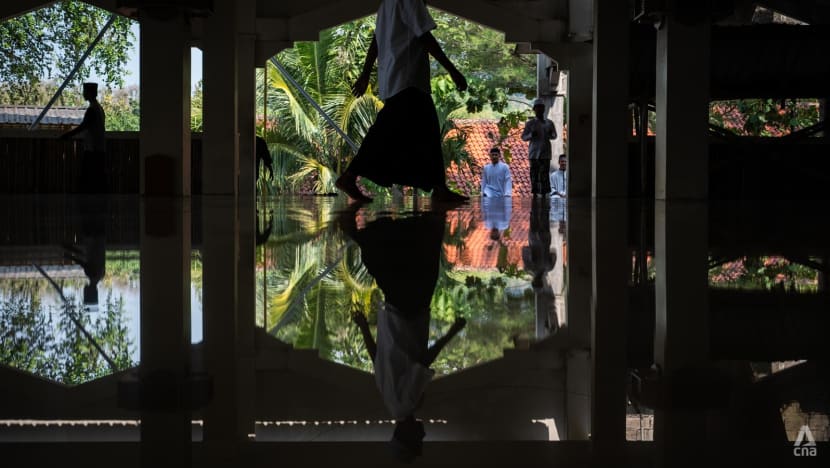
Pupils getting ready to perform Friday prayers at the Darusy Syahadah boarding school in Boyolali, Indonesia. The school was once closely linked to the terror network Jemaah Islamiyah (JI) and served as one of its main recruiting grounds. (Photo: CNA/Wisnu Agung Prasetyo)

This audio is generated by an AI tool.
JAKARTA/JOHOR: For weeks, security analysts and scholars in the region have been debating the significance of a particular video.
In the three-minute video taken on Jun 30, 16 senior members of Southeast Asia’s most notorious terrorism network, Jemaah Islamiyah (JI), announced the group’s dissolution and pledged their allegiance to the Unitary Republic of Indonesia.
A video of the announcement was subsequently uploaded on the YouTube account of hardline Islamic website Arrahmah on Jul 3.
In the video, the senior leaders said they “are ready to abide by the law that applies in the Unitary Republic of Indonesia” and guarantee that the curriculum and teaching materials found in schools affiliated to JI “will be free from the attitude of extremism”.
It intensified the spotlight on JI that had begun after an earlier incident at a police station in Johor’s Ulu Tiram which resulted in the death of two policemen as well as the suspected attacker.
It was initially thought to be linked to JI with earlier reports suggesting that the attacker - who was killed - had been a member of the terror group.
However, Malaysian authorities later said the attacker acted as a lone wolf and did not have plans to threaten the wider public.
Still, five family members of the alleged attacker were arrested and charged in court. The patriarch of the family particularly, was charged among others for inciting terrorism by promoting the ideology of violence associated with the Islamic State (ISIS).
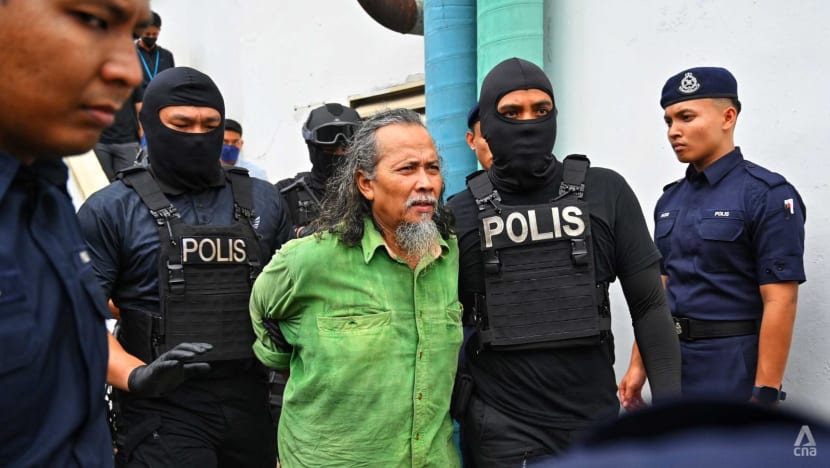
The 62-year-old man was reported to have propagated ISIS teachings among his family members – including the alleged attacker – over a period of a number of years.
And separately in end-June, Malaysian police nabbed eight people for alleged links to ISIS. Initial police investigations into the suspects revealed threats made against Malaysia’s King, Sultan Ibrahim Sultan Iskandar, Prime Minister Anwar Ibrahim, dignitaries and senior police officials.
These developments have since cast a spotlight on the continued threat of terrorism in the region.
While analysts say that JI’s dissolution announcement may assuage some concerns about the terrorism threat in Southeast Asia for now, they argue that it may lead to an emergence of splinter groups that are potentially more violent.
Beyond the attention on JI, experts also told CNA that the recent arrests in Malaysia have highlighted an ongoing spread of radical religious ideology which they say is a manifestation of long-standing, deep and broad terrorism networks in Indonesia, Malaysia and Singapore.
JI’S ANNOUNCED DISSOLUTION AND THREAT OF SPLINTER CELLS
The announcement on JI’s dissolution - some 31 years after it was established in 1993 - was made by Abu Rusdan, who had led the group from 2003 to 2004.
Two of his successors were standing behind him: Zarkasih, who led JI from 2005 to 2007 and the group’s last known leader, Para Wijayanto, who led the organisation from 2009 to 2019.
Other notable JI members include: Arif Siswanto, who was tapped to be the next JI leader before he was arrested in 2020; Bambang Sukirno, the head of JI’s charity arm Hilal Ahmar Society Indonesia; and Abu Dujana, a bomb-making expert who was convicted in 2008 for his involvement in a number of terrorism attacks.
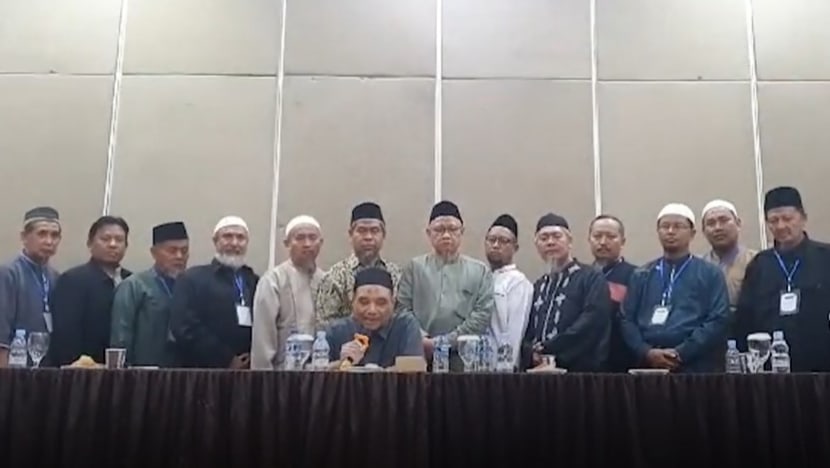
Analysts whom CNA spoke to agreed that the 16 men who signed the statement were well respected within JI ranks, but whether their decision to dissolve the organisation will be honoured by all of the estimated 6,000 members of the group remains to be seen.
Disgruntled members who see the decision as a betrayal, experts predicted, could either seek to revive JI, establish their own terror group or join existing ones like ISIS-backed Jamaah Ansharut Daulah (JAD). Some might even try to vent their frustration by launching terror attacks.
“This is a critical moment because we still don't know how each member will react,” Mr Adhe Bhakti, executive director of think-tank, Centre for Radicalism and Deradicalisation Studies (PAKAR) told CNA.
“The threat is not over yet. We all must remain vigilant."
HOW JI CELLS OPERATE
Part of the reason why Jemaah Islamiyah (JI) has survived for more than three decades despite hundreds of arrests and raids is the fact that the group consists of loosely-linked cells, says analysts and former members of the group.
“Even an amir only knows division chief levels. He does not know who the people working inside these divisions are and he is not allowed to know,” former JI secretary Hadi Masykur told CNA, referring to the group’s leader by its Arabic term, which literally means “commander”.
These divisions are further divided into smaller teams and communications between them are kept to a minimum.
The system ensures that if one member is arrested, only his immediate teammates will be compromised instead of the whole network.
Another safeguard is that once a member is arrested, he is automatically ostracised from the rest of the organisation until that person can prove that he has not cooperated with the police and is still committed to the JI’s cause.
“It happened to me when the police were zeroing in on me. I refused to leave my mother and go into hiding,” the 46-year-old said of the days before he was arrested in 2019. “I was immediately cut off from JI.”
The rules, Hadi said, apply to everyone inside the organisation regardless of their ranks and seniority, including the amirs.
Mr Adhe Bhakti of PAKAR said this system is the reason why the Jun 30 decision does not carry any weight in the eyes of some JI members.
“They can easily say ‘didn’t we agree that those who were arrested should be treated as outsiders and can no longer speak on our behalf?’,” the terrorism expert said.
The only person whose words carry weight inside JI is the organisation’s amir, Hadi said. The former JI secretary had reasons to believe that the group might be leaderless after Para Wijayanto’s arrest in 2019 and that of his interim replacement Arif in 2020.
“Arif was the last active senior figure inside JI ... the last person who knows the ins and outs of JI,” Hadi, who was released in Sep 2022 after serving a three-and-a-half year prison sentence for his role in JI, said. “After Arif was arrested, all that was left were the juniors.”
This puts the 6,000 active members of JI in a peculiar position, said Dr Noor Huda Ismail, a visiting fellow at S. Rajaratnam School of International Studies (RSIS).
On one hand, the various cells inside JI are free to do whatever they want in the absence of a clear leader. On the other hand, there is no one senior enough who is still committed to JI’s cause and can provide them with guidance.
“Whenever certain cells were about to launch a terror attack, senior members of the organisation are consulted. You can say they were shopping for fatwas (edicts) from the elders so they can have an ease of mind that what they were doing was righteous in the eyes of religion and not just ordinary acts of crime,” Dr Huda told CNA.
Police believed that perpetrators of the 2002 Bali Bombings consulted JI co-founder and then amir, Abu Bakar Baasyir before launching the deadly attacks. Baasyir was in 2005 found guilty of conspiracy over the 2002 bombings by the lower court but his conviction was overturned on appeal.
Baasyir, 85, was eventually convicted of aiding a 2010 paramilitary training camp in Sumatra. His 15-year prison sentence was reduced on humanitarian grounds after suffering several illnesses related to his old age. He was released in 2021 and has since decided to cooperate with the government.
Dr Huda of RSIS believes the Jun 30 declaration by the 16 senior members of JI was a positive step in reducing the number of people who can provide blessings to such terror attacks in the future.
He added: “The dissolution of JI is good news, a good start, but it's too early for us to close the JI chapter. Hopefully not, but I think we cannot rule out the possibility of the emergence of splinter groups which may be more violent than JI
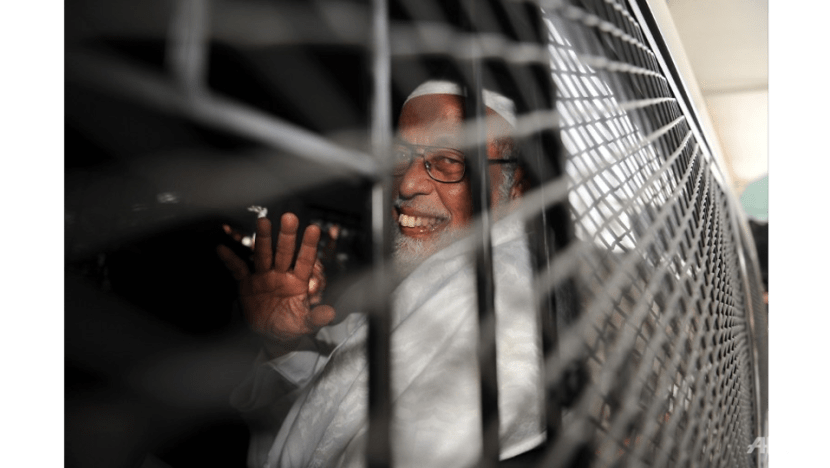
The emergence of splinter groups is not without precedent.
Dr Huda said that JI itself was the product of a splinter group of an earlier radical movement Darul Islam - an organisation which waged insurgency in West Java against the Indonesian government between 1948 and 1962 to establish an Islamic state.
A split occurred in Darul Islam between 1992 and 1993, which later led to key leader Abu Bakar Baasyir - who continued to preach an ideology of an Islamic state by waging a jihad - to form JI.
Years after he was replaced by Abu Rusdan as JI amir (commander), Baasyir set up Jamaah Ansharut Tauhid (JAT) in 2008. Baasyir recruited several top members of JI and set up a terrorism training camp in Sumatra.
Members of JAT would spawn their own splinter group - the JAD - which is backed by ISIS. JAD was responsible for several terrorism attacks in Indonesia, most notably the 2016 Jakarta attacks and the 2018 Surabaya attacks which killed four and fifteen civilians respectively.
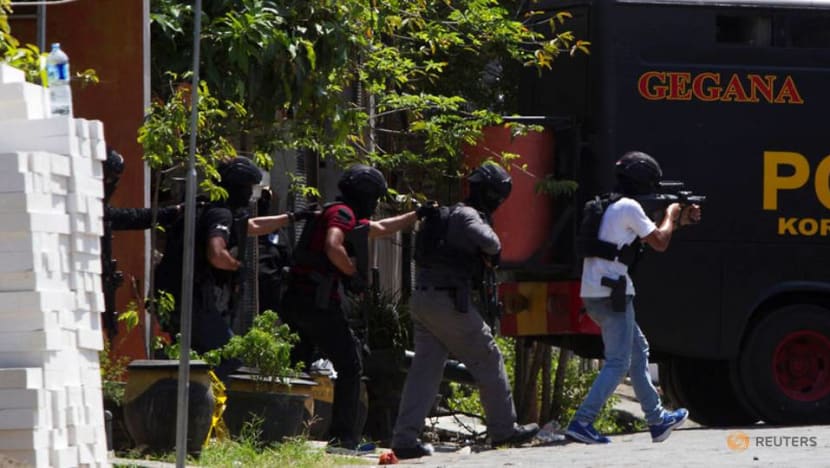
Jakarta-based think-tank the Institute for Policy Analysis of Conflict (IPAC) wrote that in the aftermath of the Jun 30 declaration, the emergence of a splinter group is possible, albeit not immediately.
“This is the first time ... that such a large group of senior leaders has come forward publicly to announce a strategic shift. If there is opposition, it may take some time for it to crystallise and find the leaders who can make an alternative organisation viable,” the think-tank wrote in its Jul 4 report.
Meanwhile, Dr Noor Huda Ismail - a visiting fellow at S. Rajaratnam School of International Studies (RSIS) - said that while there has been an effort by some senior JI leaders to make the organisation cohesive, he noted that there is evidence of some members showing violent tendencies.
“We are seeing individual members who take violent initiatives to achieve whatever goals they have. For instance, JI now sends some of its young cadres to Syria and the idea is for them to pick up knowledge and come back, but yet some of them have been involved in (military) attacks,” he said.
Another possible scenario is for disgruntled JI members to join rival terror networks like the JAT, the JAD or the Majelis Mujahidin Indonesia (MMI), which the United States declared as a terrorist organisation in 2017.
Switching allegiances is common among terror cells in Southeast Asia.
Indonesia’s Eastern Indonesia Mujahidin (MIT), for example, was once linked to Al-Qaeda and JI but later aligned itself with ISIS and JAD. The same happened with the Abu Sayyaf Group in Southern Philippines which was once the training ground for many JI militants in the 1990s and 2000s until the former switched sides to ISIS in 2010s.
The phenomenon also happened at an individual level.
The father of the man who launched the attack on Ulu Tiram police station in Johor Bahru was a former JI member who has since pledged allegiance to ISIS. Radin Imran Mohd Yassin allegedly propagated ISIS teachings to his wife and four children, including the suspect Radin Luqman.
Luqman, 21, was shot dead in the attack which killed two police officers and injured another.
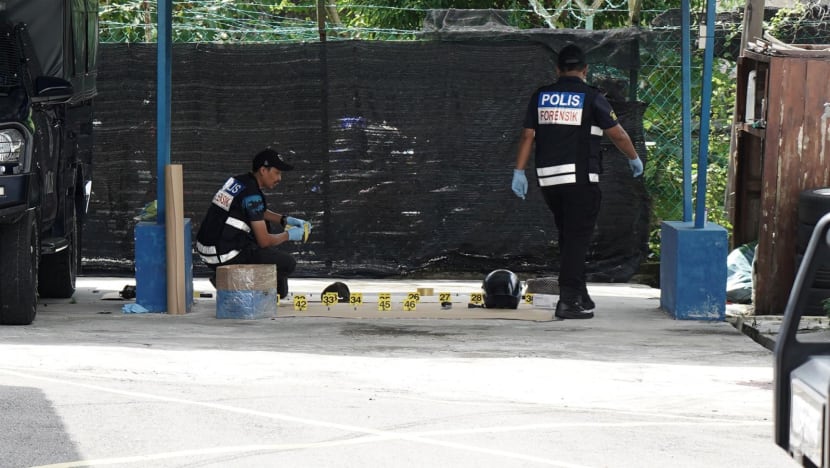
On Jul 6, Singapore’s Ministry of Home Affairs said the dissolution of JI in Indonesia is a "significant development and a major accomplishment" for Indonesian authorities.
However, it warned that the threat of terrorism to Singapore remains high and the country continues to be a prized target for terrorists particularly with a risk in the near term of "violent splinter cells" emerging from the dissolution.
Mr Ridlwan Habib, a security expert at Indonesia’s presidential office, said the government will remain vigilant to anticipate potential acts of terrorism as a result of this declaration.
Security, he added, will be stepped up in the coming months particularly as Indonesia celebrates its 79th year of independence in August and inaugurates the country’s next president Prabowo Subianto and vice-president Gibran Rakabuming Raka in October.
“The next three months must be monitored so that the situation remains safe, secure and tension free,” Mr Ridlwan told reporters on Jul 16 as quoted by Kompas.
The government, he said, is also prepared to provide financial and technical assistance to reformed JI members as well as schools and foundations formerly linked to the terror group.
But Assoc Prof Bilveer Singh, who is deputy head of National University of Singapore’s political science department, told CNA that he does not believe that the threat JI poses has dissolved.
He said that based on his sources, the event to announce the dissolution was organised by Indonesia’s National Counter Terrorism Agency (BNPT) and may prove to be a false dawn.
He warned that the already-formed JI splinter groups like the JAD, JAT as well as the MMI are ready to take over the mantle as one of the region’s most dangerous radical groups.
“JI has not been dissolved, it has perhaps evolved into something more dangerous,” said the terrorism researcher.
WHAT COULD BE THE MOTIVATIONS BEHIND JI’S DISSOLUTION?
JI was initially founded as an armed group bent on establishing an Islamic caliphate in Southeast Asia. Its members participated in sectarian conflicts and rebel movements across the region to reach that goal.
However, JI’s strategy shifted in 2009 under Para’s leadership.
“Para realised that people were not sympathetic towards JI participating in conflicts and launching terror attacks,” Para’s former secretary Hadi Masykur told CNA.
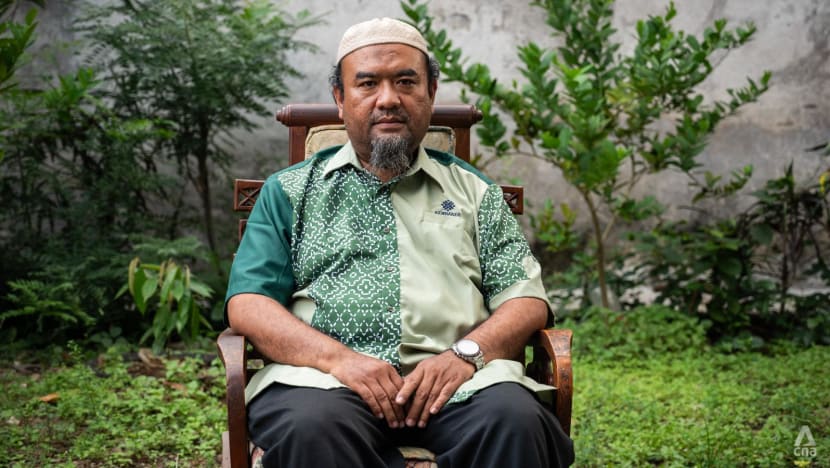
To win the hearts and minds of the general public, Para set up a number of charitable organisations, sent volunteers to disaster-hit areas and provided free healthcare for the poor.
But at the same time, the group intensified its efforts to propagate radical beliefs through JI-affiliated schools.
“Para set a target for the propagation division to recruit one new member every day. So in a year there were at least (365) new recruits,” Hadi said.
BNPT chief Mohammed Rycko Amelza Dahniel acknowledged this shift during a hearing with the country’s parliament on Jun 27.
“These terror networks and their intellectual figures fully understand that Indonesia cannot be destroyed through open attacks like bombing several cities and places. They will not win the hearts of Indonesian people,” the three star police general said.
“There is a shift of paradigm, shift of approach, from hard attacks to soft (tactics)… by radicalising the youths.”
After Para was arrested, Indonesian authorities were able to seize millions of dollars worth of JI assets, including those linked to JI’s charitable arms like Hilal Ahmar Society Indonesia, Abdurrahman bin Auf and Syam Organiser. Authorities have also identified at least 60 Islamic boarding schools spread across Indonesia with links to the terror network.

Analysts speculated that the decision to disband JI was, among others, a way to protect JI’s assets.
“The disbandment would allow them to keep running their charities and keep operating their schools. But they have to do them not in the name of JI,” Mr Adhe of PAKAR said.
Kompas newspaper wrote that the announcement was preceded by a meeting of 119 teachers and officials from JI-affiliated schools at a hotel in the outskirts of Jakarta.
Indonesian National police and the BNPT have both refused to comment on whether they had any role in the meeting and the subsequent decision to disband JI.
Experts noted however that the two institutions must have played some part in the decision since two JI figures who are still in jail: Para and Abu Rusdan participated in the announcement.
Para is now serving a seven-year prison term while Rusdan is serving a six year prison sentence. Both men are scheduled to be released in 2026 and 2027 respectively.
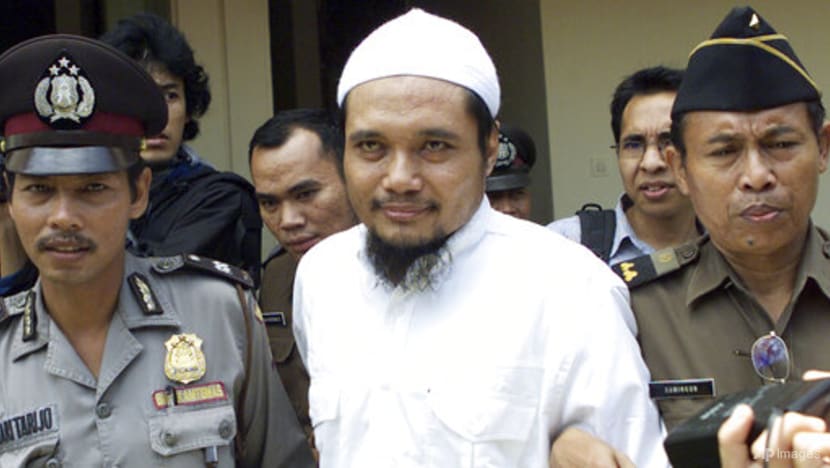
WILL JI’S RADICAL TEACHINGS STOP?
The 16 signatories of the declaration, which include teachers and officials of a number of JI-affiliated schools, vowed that the schools will be “free from extremism” and pledged to work closely with the Indonesian government on reforming their curriculum.
Experts say the decision means the schools will likely stop serving as JI’s fertile recruitment ground or a gateway to send militants to war-torn countries like Syria or Yemen, at least for now.
“However, will the school stop promoting the goal of establishing an Islamic state in Indonesia, especially given that radical teachings are often taught informally after class? That remains to be seen,” Mr Adhe, the terrorism expert, said.
One such school is the Darusy Syahadah, a 10 hectare facility on the slopes of a small hill in Boyolali, Indonesia. The Boyolali regency is about a two-hour drive from Yogyakarta.
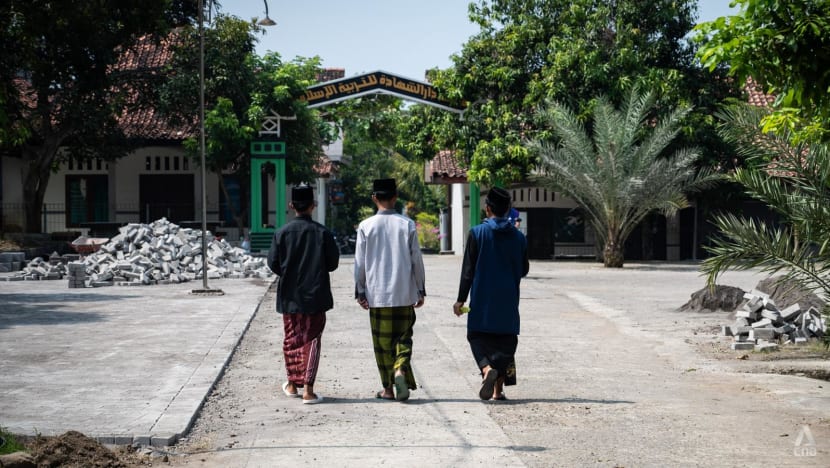
Darusy Syahadah’s founder and director Mustaqim - who like most Indonesians goes by one name - was one of the signatories of the Jun 30 declaration announcing JI’s dissolution.
The school has been on police radar for nearly twenty years ever since its alumni, Saliq Firdaus, became one of the suicide bombers in the second Bali Bombings in 2005.
Darusy Syahadah’s spokesman Mr Zaenal Abidin denied that the school has been radicalising its pupils.
“We don’t teach anything that other schools are not teaching. Anyone is welcome to come and see it for themselves,” Mr Zaenal told CNA, maintaining that the school’s militant alumni were not radicalised at Darusy Syahadah.
BNPT director for deradicalisation Achmad Nurwahid said Indonesian authorities will keep a close eye on schools with ties to the terror network but admitted that ensuring that they stop spreading radical beliefs will not be easy.
“You can’t change someone’s ideology overnight. But at the very least, (the declaration) meant that (JI-affiliated) schools are willing to open up,” he told CNA.
Mr Achmad added that the government is offering these schools scholarships, financial assistance and other programmes in the hope of building trust and partnership between them and the government.
“Once trust is built, we can start staging discussions, get reformed terrorists to speak at seminars and so on,” he said. “It’s a long process. But we are making progress.”
TERROR-RELATED INVESTIGATIONS IN MALAYSIA, SINGAPORE UNDERSCORE REGIONAL THREAT
In Malaysia, the recent spate of arrests related to radicalism is indicative of a heightened threat of terrorism in the region, security analysts told CNA.
Admittedly the scale of these incidents are small in comparison to the early 2000s when JI orchestrated terrorist attacks in Bali and Jakarta which killed hundreds.
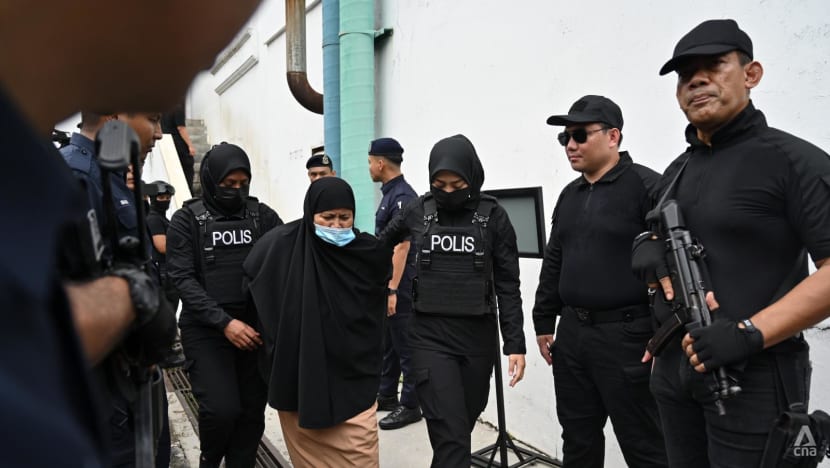
Yet, analysts pointed out that these recent arrests - including that of the family members of the Ulu Tiram attacker as well as eight others in unrelated investigations - bring attention to the deep terrorism and radicalisation networks that have taken root in the region.
The eight, for example, were aged between 25 and 70, come from various occupational and economic backgrounds, including housewives and educated professionals, including a lecturer.
Meanwhile in Singapore, Law and Home Affairs Minister K Shanmugam announced on Jul 15 that two Singaporeans had been issued restriction orders for supporting terrorism and armed violence, after they became radicalised after the Hamas attack on Israel on Oct 7, 2023.
One is a 14-year-old boy - the youngest person ever in the country to be issued the restriction order under the Internal Security Act (ISA) - while the other is a 33-year-old woman who was a manager with a statutory board.
A person under a restriction order is not allowed to change his or her residence or travel out of Singapore without the authorities' permission. They also cannot access the internet or social media without approval.
Prior to this, Singapore’s Internal Security Department (ISD) announced in February last year that a then-18-year-old Singaporean student who is an ISIS supporter was detained in December 2022 after he considered plans to attack targets in Singapore, including an army camp and a gravesite at a mosque.
Two other teenagers who were online contacts of the student were also issued ISA orders for terrorism-related activities.
The trio became acquainted online through the same extremist channel on social platform Discord, Singapore authorities had said then.
Political scientist Assoc Prof Singh told CNA that countries in the region are right to be cautious given the recent spate of incidents and developments, which may be propelled recently by the conflict in Gaza.
The Hamas attack has sparked an Israeli offensive in the Gaza strip. According to latest updates from the Gaza health authorities, more than 38,000 Palestinians have been killed.
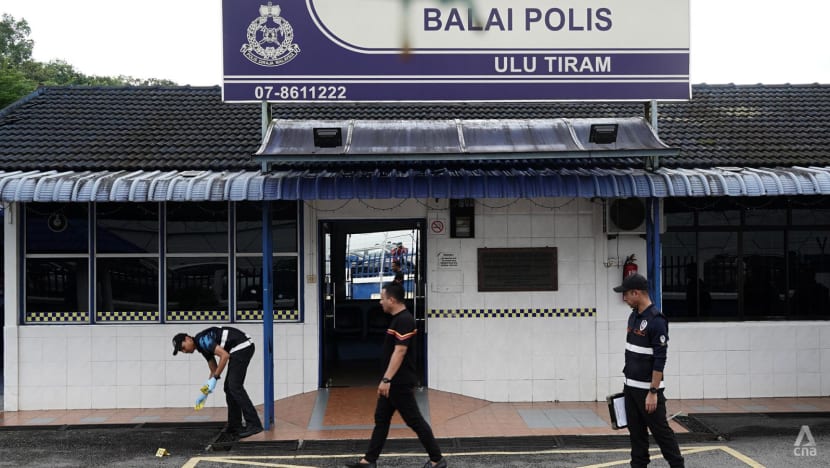
Assoc Prof Singh said this may have triggered some Muslims in Southeast Asia to be radicalised and join extremists groups in the region.
“Singapore and countries in these regions should be on heightened alert, there is an undercurrent of radical movement in the region and everyone’s guard should be up,” he added.
The anti-terrorism expert Dr Huda stressed that these recent incidents outlined how radicalisation recruitment has shifted online and that this has escalated the spread of ideology across borders, and this could translate to more physical in-person transnational attacks in the region.
“We are now seeing a different landscape now where recruitment is done through a combination of online where social media is used to document activities to coral support and synergise members,” he said.
Dr Huda cited how for instance a Malaysian who travels to Syria for militant activity then posts about this on their social media pages, and younger individuals might be triggered and motivated to follow in these footsteps.
“One of the challenges of online radicalisation is that it democratises ways for people to join a violent group. Previously if you wanted to be part of a terrorist group like JI, you had to attend a series of in-person meetings. But now we are seeing the phenomenon of connective actions - where individuals do not need to meet physically but they are connected ideologically online,” he added.
A former JI operative, who spoke to CNA on condition of anonymity, said that the recruitment by the various JI splinter radical groups is “going strong” online and this enables the groups to reach out to potential members across borders.
He explained that the modus operandi is to create public social media groups on Islamic-related matters that do not indicate obvious signs of radicalism, such as on the humanitarian crisis in Gaza.
Through discussions on these pages, these groups are then able to suss out members who show signs of being open to be radicalised through private direct messages.
“With this method, terrorist organisations are able to recruit members from across borders - from Malaysia, Indonesia, Singapore - before then offering them paramilitary training in conflict zones such as Marawi in southern Philippines,” the former operative said.
Dr Huda said that as part of his research, he has been speaking with a group he deemed as “frustrated travellers” - Indonesians who are keen to travel to Syria to partake in military training and jihad.
“They come from unimaginable backgrounds, and include professionals in society and women too,” he added.
Dr Huda said that the porous border in Southeast Asia - especially between Malaysia, Indonesia and Philippines - in the Borneo region as well as across the Sulu Sea, may promote the transnational movement of extremists.
“You have to look at this issue through the lens of transnational connections that have been taking place, leading to spread of ideologies through marriages, families,” he added.
Honing in on the Ulu Tiram case, he pointed out that the parents of the suspect in the police station attack were of different nationalities - the father Radin Imran is Malaysian while the mother Rosna Jantan is Singaporean.
COULD JOHOR BE A TERRORIST HUB IN THE REGION ONCE AGAIN?
Observers CNA spoke to also highlighted that there is concern that the Malaysian southern state of Johor could once again become a terrorist hub in the region.
Malaysian JI leaders, such as Nordin Mat Top - who masterminded several terrorist attacks in the region including the one on the JW Marriott hotel in Jakarta - as well as Zulkifli Hir (Marwan) who was reportedly involved in the 2003 Bali bombings - hailed from Johor.
The Ulu Tiram attack in May also shone a spotlight on the Luqmanul Hakiem school which is still standing in Kampung Sungai Tiram, the same village where the suspect’s family live.
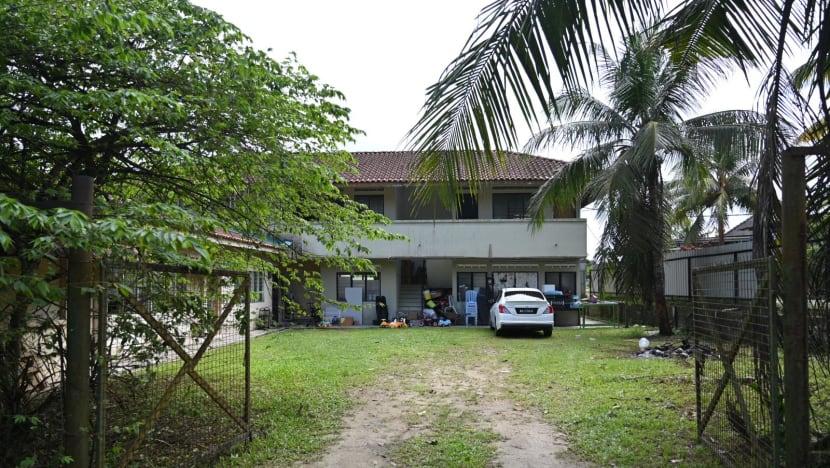
The school, which officially closed in 2001, was previously visited by key JI leaders such as Abdullah Sungkar and Abu Bakar Baasyir.
According to reports, JI leaders used the school for meetings and planning attacks. Although the school was closed, it continues to be used as a mosque for religious education for the children of Rohingya refugees from Myanmar, said Assoc Prof Singh, who has visited the village multiple times for research.
He added that the mosque continues to serve the community living in the village, which besides Radin Imran’s family, also includes the wife of executed JI leader Mukhlas and the wife of slain JI leader Nordin Top.
However, the Malaysian government had maintained that Radin Imran’s family was reclusive and the 21-year-old suspect in the case had acted as a “lone wolf”.
In May, the Johor state government said that the school could possibly be demolished due to safety and security issues.
However, when CNA visited the area recently, the building was still standing and there were children playing in the compound. CNA reporters were later asked by some of the adult residents to leave the compound, citing that the village was private property.
Assoc Prof Singh said: “The village still houses the legacy of the former kingpins of JI, traces of the organisation's legacy is still there. I think the Malaysian government wanted to play down these facts because it is an embarrassment for security agencies that they did not demolish the school earlier.”
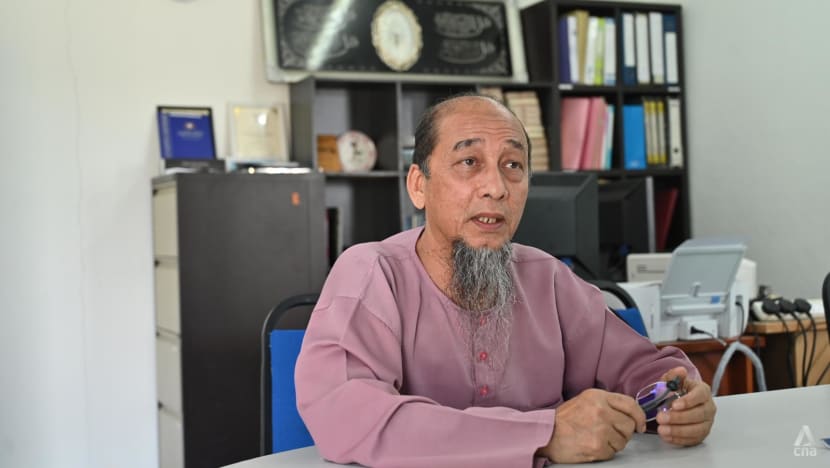
Mr Abu Bakar Muhammad Aroff - the principal of a legitimate Islamic school in Ulu Tiram called Tahfiz Ar Rayyan - that is sanctioned by the state’s Islamic religious department - told CNA that it would be a positive move to have the Luqmanul Hakiem school demolished.
“Ulu Tiram has this dark history, so maybe it’s good if they clear the school and ensure that the children in the area are sent to legitimate schools registered with the religious department,” he added.
The suspect allegedly involved in the Ulu Tiram police station attack and three of his siblings did not finish public school, and authorities said they were taught radical beliefs at home.
However, Dr Norshahril Saat - who is senior fellow and coordinator at the regional social and cultural studies programme at ISEAS-Yusof Ishak Institute - cautioned that focusing on the religious and security angles prevents a holistic understanding of the social changes happening in Johor.
He noted that based on an ISEAS survey conducted in 2017, Johor Muslims were becoming more conservative, with 75 per cent of the respondents supporting the application of hudud syariah laws.
While he stressed that conservatism does not always lead to terrorism, Dr Norshahril pointed out that radical groups that call for an alternative Islamic system of governance and laws are opposed to secular policies.
In the case of the suspect’s family in Ulu Tiram, Dr Norshahril cautioned that one should look at the holistic picture, such as the psychological well-being of the family and their financial situation, pointing out how they live in a dilapidated home.
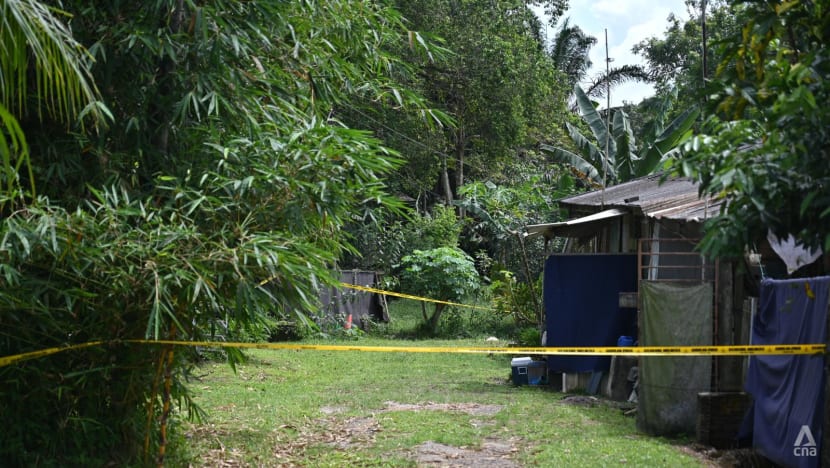
“I think at the end of the day … we need to relook at how we analyse things. You know, when the Ulu Tiram killings happened, many were quick to jump (to the conclusion) that this was an outcome of JI and was quick to make that conclusion and to link it to Islamic radicalism,” said Dr Norshahril.
“Of course, the JI threat has existed in this region for the longest time. It has devastated societies. It has carried out killings. So I think Southeast Asia is traumatised by the JI experience, but by quickly linking it, I think we missed some of the other factors that may contribute to this,” he added.
Dr Norhsahril stressed that irregardless of whether JI continues to exist, there is a trend over the last two decades of a spectrum of groups promoting radical ideas in the region.
“Where it's JI or non-JI, we should tackle the issue holistically. We should look at ideology - JI may be promoted in different ways across different mediums. So we should focus on JI, or its other equivalent groups recruiting individuals through its networks and family ties,” he said.






















